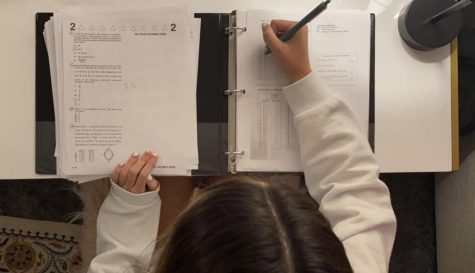Students ACT with success

The ACT is a dreaded rite of passage for most high school students. Some colleges weigh scores heavily in acceptance and scholarship decisions, so many feel pressure to excel on the standardized test. But in an environment saturated with resources, how can students make real advancements towards higher scores?
For some, better scores are achieved with the help of a tutor. ACT tutors equip students with proper study habits, test taking strategies, and stress management techniques.
Joseph Chapman, ‘22, improved his ACT score by 6 points with the help of tutor Jason Derby. One of the most beneficial things he learned was how to manage his time during the quick-paced exam.
“When I’m taking a test, I normally like to make sure every answer is correct. I learned that when you have 45 minutes to answer 75 questions, you can’t just sit there and ask yourself if it’s the right answer,” Chapman stated. “You just have to circle it and move on.”
Chapman noted that as his knowledge increased with the help of a tutor, his time management skills also improved.
Nadine Mueller, ‘23, also improved her ACT score by working with Derby. She thinks the best way to improve is to learn the material and apply it repeatedly.
“Improvement comes with practice,” Mueller said. “Take practice tests over and over again, and don’t cram all of your studying into the night before the exam,” she advises.
Mueller suggested beginning the study process about three months before the ACT; this allows time to spread out the preparation work.
Jason Derby, a teacher from Cuba City, Wisc., is a popular ACT tutor in the area. He sees achieving success on the ACT as a three-pronged approach: content knowledge, awareness of ACT formatting, and time management.
Derby agrees with Mueller’s suggestions. He believes that practice tests are a great way to raise a score, regardless of whether a student is working with a tutor.
“Taking real ACT practice tests is probably the cheapest, quickest, and easiest way to improve,” Derby stated. “You would skim the surface of time management, content, and format.”
Derby noted that instead of focusing on quick fixes, students should focus on gaining content and test knowledge. This may involve filling gaps in geometry knowledge or learning how to efficiently skim a reading passage.
No matter a student’s natural intelligence, Derby noted that it’s always possible to raise an ACT score with effort and dedication.
Said Derby, “A lot of people feel like the ACT is based on your IQ — like your score is set in stone. That’s just not true. As you learn more information, your score will improve.”

Ava Hoelscher is a senior at Wahlert Catholic High School and an editor of The Gleaner. She participates in show choir, ballet, dance team, and theatre....




